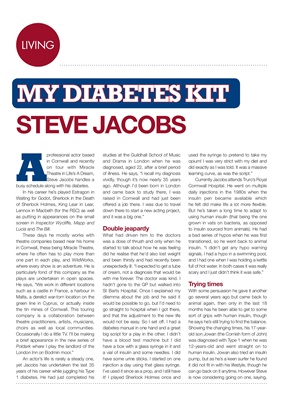
LIVINGLIVING
MY DIABETES KIT
A
professional actor based
in Cornwall and recently
on tour with Miracle
Theatre in Life's A Dream,
Steve Jacobs handles a
busy schedule along with his diabetes.
In his career he's played Estragon in
Waiting for Godot, Sherlock in the Death
of Sherlock Holmes, King Lear in Lear,
Lennox in Macbeth (for the RSC) as well
as putting in appearances on the small
screen in Inspector Wycliffe, Mapp and
Lucia and The Bill.
These days he mostly works with
theatre companies based near his home
in Cornwall, these being Miracle Theatre,
where he often has to play more than
one part in each play, and WildWorks,
where every show is an adventure. He is
particularly fond of this company as the
plays are undertaken in open spaces.
He says, "We work in different locations
such as a castle in France, a harbour in
Malta, a derelict war-torn location on the
green line in Cyprus, or actually inside
the tin mines of Cornwall. This touring
company is a collaboration between
theatre practitioners, artists, musicians,
choirs as well as local communities.
Occasionally I do a little TV. I'll be making
a brief appearance in the new series of
Poldark where I play the landlord of the
London Inn on Bodmin moor."
An actor's life is rarely a steady one,
yet Jacobs has undertaken the last 35
years of his career while juggling his Type
1 diabetes. He had just completed his
STEVE JACOBS
studies at the Guildhall School of Music
and Drama in London when he was
diagnosed, aged 22, after a brief period
of illness. He says, "I recall my diagnosis
vividly, though it's now nearly 35 years
ago. Although I'd been born in London
and came back to study there, I was
raised in Cornwall and had just been
offered a job there. I was due to travel
down there to start a new acting project,
and it was a big one."
Double jeapardy
What had driven him to the doctors
was a dose of thrush and only when he
started to talk about how he was feeling
did he realise that he'd also lost weight
and been thirsty and had recently been
unexpectedly ill. "I expected to get a tube
of cream, not a diagnosis that would be
with me forever. The doctor was kind. I
hadn't gone to the GP but walked into
St Barts Hospital. Once I explained my
dilemma about the job and he said it
would be possible to go, but I'd need to
go straight to hospital when I got there,
and that the adjustment to the new life
would not be easy. So I set off. I had a
diabetes manual in one hand and a great
big script for a play in the other. I didn't
have a blood test machine but I did
have a box with a glass syringe in it and
a vial of insulin and some needles. I did
have some urine sticks. I started on one
injection a day using that glass syringe.
I've used it since as a prop, and I still have
it! I played Sherlock Holmes once and
used the syringe to pretend to take my
opium! I was very strict with my diet and
did exactly as I was told. It was a massive
learning curve, as was the script."
Currently Jacobs attends Truro's Royal
Cormwall Hospital. He went on multiple
daily injections in the 1980s when the
insulin pen became available which
he felt did make life a lot more flexible.
But he's taken a long time to adapt to
using human insulin (that being the one
grown in vats on bacteria, as opposed
to insulin sourced from animals). He had
a bad series of hypos when he was first
transitioned, so he went back to animal
insulin. "I didn't get any hypo warning
signals. I had a hypo in a swimming pool,
and I had one when I was holding a kettle
full of hot water. In both cases it was really
scary and I just didn't think it was safe."
Trying times
With some persuasion he gave it another
go several years ago but came back to
animal again, then only in the last 18
months has he been able to get to some
sort of grips with human insulin, though
he says he's still trying to find the balance.
Showing the changing times, his 17-yearold son
Jowan (the Cornish form of John)
was diagnosed with Type 1 when he was
12-years-old and went straight on to
human insulin. Jowan also tried an insulin
pump, but as he's a keen surfer he found
it did not fit in with his lifestyle, though he
can go back on it anytime. However Steve
is now considering going on one, saying,